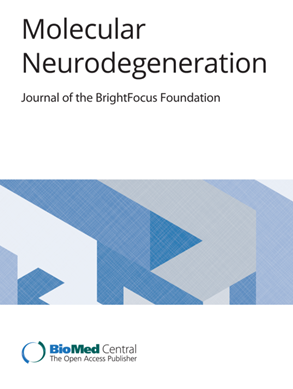Alpha synuclein co-pathology is associated with accelerated amyloid-driven tau accumulation in Alzheimer’s disease
IF 17.5
1区 医学
Q1 NEUROSCIENCES
引用次数: 0
Abstract
Aggregated alpha-Synuclein (αSyn) is a hallmark pathology in Parkinson’s disease but also one of the most common co-pathologies in Alzheimer’s disease (AD). Preclinical studies suggest that αSyn can exacerbate tau aggregation, implying that αSyn co-pathology may specifically contribute to the Aβ-induced aggregation of tau that drives neurodegeneration and cognitive decline in AD. To investigate this, we combined a novel CSF-based seed-amplification assay (SAA) to determine αSyn positivity with amyloid- and tau-PET neuroimaging in a large cohort ranging from cognitively normal individuals to those with dementia, examining whether αSyn co-pathology accelerates Aβ-driven tau accumulation and cognitive decline. In 284 Aβ-positive and 308 Aβ-negative subjects, we employed amyloid-PET, Flortaucipir tau-PET, and a CSF-based αSyn seed-amplification assay (SAA) to detect in vivo αSyn aggregation. CSF p-tau181 measures were available for 384 subjects to assess earliest tau abnormalities. A subset of 155 Aβ-positive and 135 Aβ-negative subjects underwent longitudinal tau-PET over approximately 2.5 years. Using linear regression models, we analyzed whether αSyn SAA positivity was linked to stronger Aβ-related increases in baseline fluid and PET tau biomarkers, faster Aβ-driven tau-PET increase, and more rapid cognitive decline. αSyn SAA positivity was more common in Aβ + vs. Aβ- subjects and increased with clinical severity (p < 0.001). Most importantly, αSyn positivity was also associated with greater amyloid-associated CSF p-tau181 increases (p = 0.005) and higher tau-PET levels in AD-typical brain regions (p = 0.006). Longitudinal analyses confirmed further that αSyn positivity was associated with faster amyloid-related tau accumulation (p = 0.029) and accelerated amyloid-related cognitive decline, potentially driven driven by stronger tau pathology. Our findings suggest that αSyn co-pathology, detectable via CSF-based SAAs, is more prevalent in advanced AD and contributes to the development of aggregated tau pathology thereby driving faster cognitive decline. This highlights that a-Syn co-pathology may specifically accelerate amyloid-driven tau pathophysiology in AD, underscoring the need to consider αSyn in AD research and treatment strategies.α突触核蛋白共病理与阿尔茨海默病中淀粉样蛋白驱动的tau蛋白积累加速相关
聚集α -突触核蛋白(αSyn)是帕金森病的标志性病理,也是阿尔茨海默病(AD)最常见的共病理之一。临床前研究表明,αSyn可加剧tau聚集,这表明αSyn共病理可能特异性地促进了a β诱导的tau聚集,从而导致AD患者神经变性和认知能力下降。为了研究这一点,我们结合了一种新的基于脑脊液的种子扩增试验(SAA),通过淀粉样蛋白和tau- pet神经显像在从认知正常个体到痴呆症患者的大型队列中检测αSyn阳性,研究αSyn共同病理是否加速了a β驱动的tau积累和认知能力下降。在284例a β阳性和308例a β阴性受试者中,我们采用淀粉样蛋白pet、Flortaucipir tau-PET和基于csf的αSyn种子扩增法(SAA)检测体内αSyn聚集。384名受试者可通过CSF p-tau181测量来评估早期tau异常。在大约2.5年的时间里,155名Aβ阳性和135名Aβ阴性受试者接受了纵向tau-PET检测。利用线性回归模型,我们分析了αSyn SAA阳性是否与a β相关的基线液体和PET tau生物标志物的增加、a β驱动的tau-PET增加更快以及认知能力下降更快有关。αSyn SAA阳性在α β + vs中更为常见。随着临床严重程度的增加而增加(p < 0.001)。最重要的是,αSyn阳性还与淀粉样蛋白相关CSF p-tau181升高(p = 0.005)和ad典型脑区较高的tau-PET水平相关(p = 0.006)。纵向分析进一步证实,αSyn阳性与淀粉样蛋白相关的tau蛋白积累速度加快(p = 0.029)和淀粉样蛋白相关的认知能力下降加速有关,可能是由更强的tau病理学驱动的。我们的研究结果表明,通过基于csf的SAAs检测到的αSyn共病理在晚期AD中更为普遍,并有助于聚集性tau病理的发展,从而加速认知能力的下降。这凸显了a-Syn共病理可能特异性地加速AD中淀粉样蛋白驱动的tau病理生理,强调了在AD研究和治疗策略中考虑αSyn的必要性。
本文章由计算机程序翻译,如有差异,请以英文原文为准。
求助全文
约1分钟内获得全文
求助全文
来源期刊

Molecular Neurodegeneration
医学-神经科学
CiteScore
23.00
自引率
4.60%
发文量
78
审稿时长
6-12 weeks
期刊介绍:
Molecular Neurodegeneration, an open-access, peer-reviewed journal, comprehensively covers neurodegeneration research at the molecular and cellular levels.
Neurodegenerative diseases, such as Alzheimer's, Parkinson's, Huntington's, and prion diseases, fall under its purview. These disorders, often linked to advanced aging and characterized by varying degrees of dementia, pose a significant public health concern with the growing aging population. Recent strides in understanding the molecular and cellular mechanisms of these neurodegenerative disorders offer valuable insights into their pathogenesis.
 求助内容:
求助内容: 应助结果提醒方式:
应助结果提醒方式:


